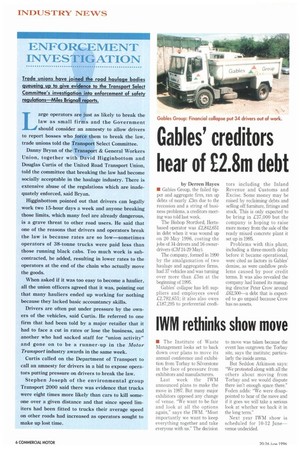ENFORCEMENT INVESTIGATION
Page 8

If you've noticed an error in this article please click here to report it so we can fix it.
I 4 sive operators are just as likely to break the law as small firms and the Government should consider an amnesty to allow drivers to report bosses who force them to break the law, trade unions told the Transport Select Committee.
Danny Bryan of the Transport & General Workers Union, together with David Higginbottom and Douglas Curtis of the United Road Transport Union, told the committee that breaking the law had become socially acceptable in the haulage industry. There is extensive abuse of the regulations which are inadequately enforced, said Bryan.
Higginbottom pointed out that drivers can legally work two 15-hour days a week and anyone breaking those limits, which many feel are already dangerous, is a grave threat to other road users. He said that one of the reasons that drivers and operators break the law is because rates are so low—sometimes operators of 38-tonne trucks were paid less than those running black cabs. Too much work is subcontracted, he added, resulting in lower rates to the operators at the end of the chain who actually move the goods.
When asked if it was too easy to become a haulier, all the union officers agreed that it was, pointing out that many hauliers ended up working for nothing because they lacked basic accountancy skills.
Drivers are often put under pressure by the owners of the vehicles, said Curtis. He referred to one firm that had been told by a major retailer that it had to face a cut in rates or lose the business, and another who had sacked staff for "union activity" and gone on to be a runner-up in the Motor Transport industry awards in the same week.
Curtis called on the Department of Transport to call an amnesty for drivers in a bid to expose operators putting pressure on drivers to break the law.
Stephen Joseph of the environmental group Transport 2000 said there was evidence that trucks were eight times more likely than cars to kill someone over a given distance and that since speed limiters had been fitted to trucks their average speed on other roads had increased as operators sought to make up lost time.
















































































































